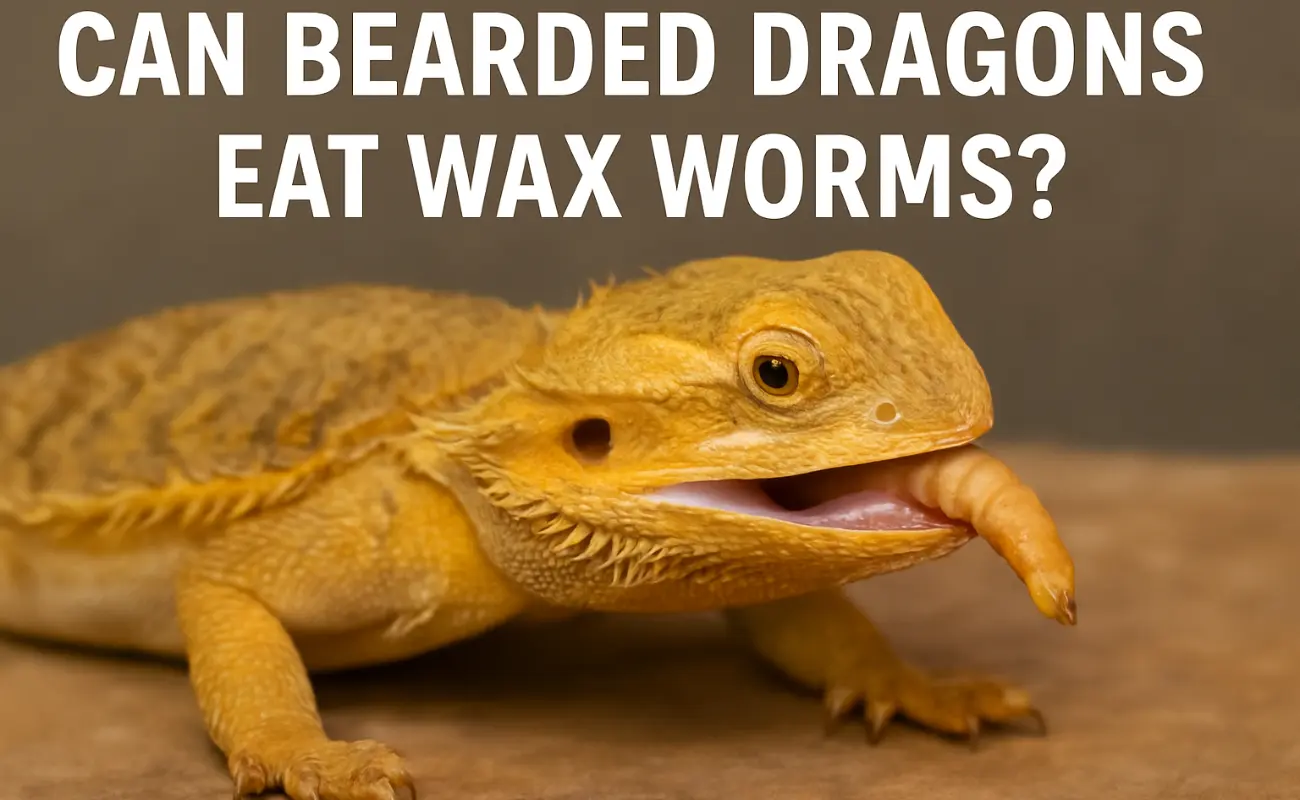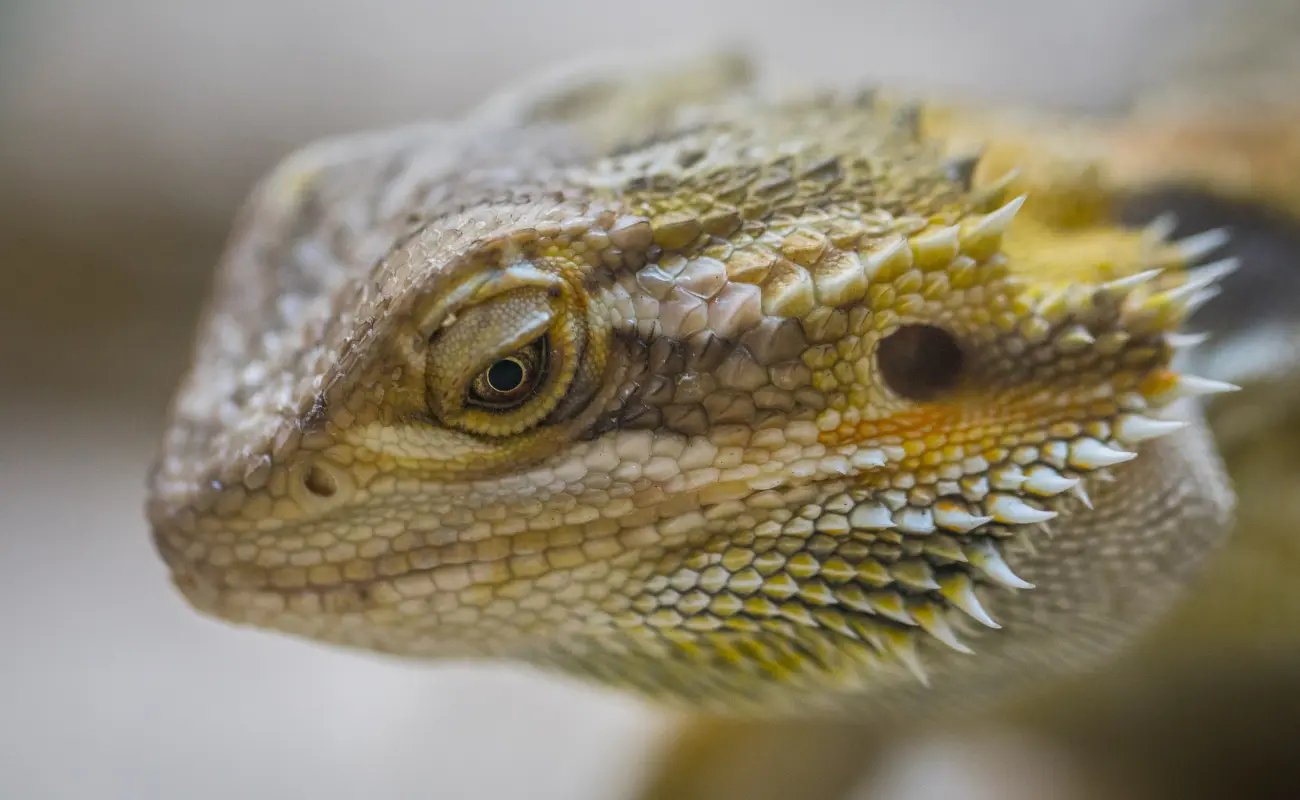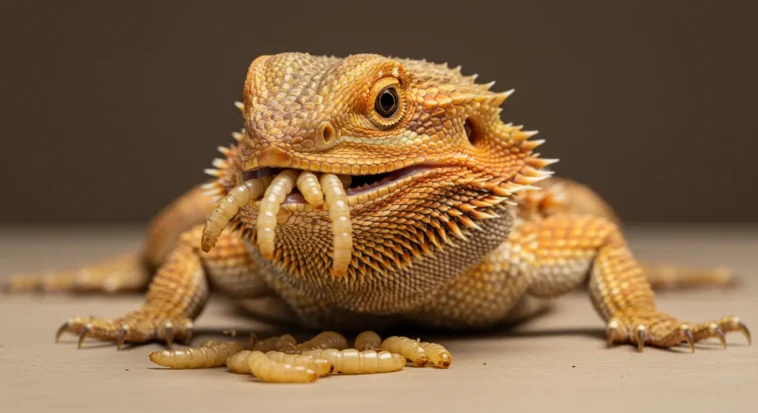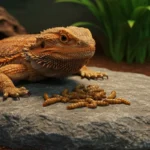Can bearded dragons eat wax worms? This is a common question among reptile owners, and for good reason. Wax worms are often used as treats for bearded dragons due to their sweet, fatty nature. However, before you start feeding them to your pet, it’s essential to understand their nutritional value and the potential risks involved.
So, can bearded dragons eat wax worms? Yes, they can, but only occasionally. In this article, we will explore how and when to include wax worms in your bearded dragon’s diet and the potential health implications of overfeeding them. Let’s dive into the details of this treat, and help you understand how to best care for your bearded dragon while keeping their diet balanced and healthy.
Overview
Feeding your bearded dragon a balanced diet is key to their health and well-being. While many insects are a staple in their diet, not all of them are equally nutritious. Wax worms are one such treat that is often given to bearded dragons, but they should be used sparingly. Here’s an overview of what you need to know about wax worms:
-
Wax worms are packed with fat but offer minimal protein.
-
They should only be offered occasionally and not as a primary food source.
-
Bearded dragons are typically drawn to wax worms due to their soft texture and sweet flavor.
In this article, we’ll explore why wax worms can be a dangerous option for daily feeding and how to include them as an occasional treat without causing harm.
Can Bearded Dragons Consume Wax Worms?
Bearded dragons can eat wax worms, but they should only be offered in moderation. These worms are a high-fat, low-protein food source, making them unsuitable for a regular part of a bearded dragon’s diet. Overfeeding can result in serious health issues, including obesity and nutritional imbalances.
Wax worms should be given as an occasional treat, not a regular food source. While bearded dragons enjoy the sweet, fatty flavor, frequent feeding can lead to overconsumption and health issues.
Can Wax Worms Be Part of a Bearded Dragon’s Daily Diet?
No, wax worms should not be part of a bearded dragon’s daily diet. Due to their high fat content, they are nutritionally poor and can lead to obesity and other health complications when consumed too often. If wax worms are fed daily, it can cause:
-
Addiction: Bearded dragons may become fixated on wax worms, refusing other, more nutritious food options like vegetables or other insects.
-
Obesity: The high-fat content in wax worms contributes to excessive weight gain, leading to obesity and associated health risks.
-
Metabolic Bone Disease (MBD): A diet too rich in fat but poor in calcium can contribute to bone health issues in bearded dragons.
-
Liver/Kidney Issues: Overfeeding fatty foods can cause liver and kidney problems over time.

Do Bearded Dragons Like Eating Wax Worms?
Yes, most bearded dragons love eating wax worms. Their soft texture and sweetness make them a highly desirable treat for beardies. However, this can be a double-edged sword. Thanks to their high-fat content and irresistible flavor, wax worms can quickly become a favorite—and even addictive—treat for bearded dragons.
If a bearded dragon gets too accustomed to eating wax worms, they might start rejecting other, more nutritious food like leafy greens or protein-rich insects such as crickets or dubia roaches. This can lead to a nutritional imbalance that affects their overall health.
How Frequently Should Wax Worms Be Given to Bearded Dragons?
Adult bearded dragons should only be given wax worms once or twice a month. Overfeeding can result in the health issues discussed earlier. Below is a guide based on age and size:
-
Adult bearded dragons: Offer 5-10 wax worms per session, but only once or twice a month. Be sure to rotate with other nutritious foods like crickets, dubia roaches, or hornworms.
-
For juvenile bearded dragons: Restrict the number of wax worms to 1-2 per week. As young beardies need a protein-rich diet for proper growth, wax worms should only be an occasional treat.
-
Baby bearded dragons: Avoid offering wax worms regularly. They can be used occasionally for training or as a treat but should not be relied upon as a staple due to their high fat content.
Should Bearded Dragons Be Fed Mealworms?
Yes, but with caution. While mealworms are commonly available and can be an occasional treat for bearded dragons, they have some drawbacks. Mealworms are also high in fat and phosphorus, which can cause impaction in younger dragons and lead to metabolic issues if fed in excess. They are harder to digest due to their tough exoskeleton, especially for juvenile beardies.
-
For adults: Mealworms can be fed 1-2 times a week, but in limited quantities (5-6 worms).
-
For juveniles: Only offer 1-2 soft-bodied mealworms per week to avoid digestion issues.
How Much Wax Worm Is Appropriate for Juvenile Bearded Dragons?
Juvenile bearded dragons should only be given 1-2 wax worms per week. They need a protein-rich diet to fuel their growth, so wax worms should not replace staple foods like crickets or dubia roaches. Overfeeding wax worms can lead to excessive weight gain and a lack of the nutrients essential for healthy growth.
Is It Safe to Feed Wax Worms to Baby Beardies?
Wax worms can be safely offered to baby beardies, but only on occasion. The high-fat content of wax worms makes them inappropriate as a regular food source for young dragons.
For proper growth, baby bearded dragons need a diet that is high in protein and low in fat. Overfeeding wax worms can result in obesity or nutritional deficiencies, which can negatively impact their growth and development.
Do Bearded Dragons Eat Superworms?
Bearded dragons can eat superworms, but they should be offered in moderation. While they contain more protein than wax worms, making them a somewhat better option, superworms are still high in fat and should only be treated as an occasional snack. Overfeeding can lead to:
-
Obesity: Excessive fat intake can lead to weight problems.
-
Impaction: Bearded dragons may have difficulty digesting the hard exoskeleton of superworms.
-
Biting injuries: Superworms are more aggressive than other insects and may bite, causing injury to your bearded dragon.
Is It Safe for Bearded Dragons to Eat Wax Moths?
While not directly mentioned in the sources, wax moths are the adult form of wax worms. In general, wax moths should be fed very rarely, if at all. They provide little nutritional value and may pose digestive challenges for your bearded dragon. If you choose to feed wax moths, make sure they are captive-bred to avoid parasites or toxins that wild moths might carry.
Tips for Feeding Wax Worms to Bearded Dragons
To ensure your bearded dragon enjoys wax worms without adverse effects, here are some tips:
-
Serve as an Occasional Treat: Offer wax worms as a special treat or to encourage a finicky eater.
-
Rotate with Other Insects: Use a variety of insects like crickets, dubia roaches, or black soldier fly larvae to provide a balanced diet.
-
Control Portions: Stick to the recommended serving sizes to prevent overfeeding.
Benefits of Wax Worms for Bearded Dragons
Despite their high fat content, wax worms have some benefits when fed correctly:
-
Stimulate Appetite: Wax worms can be used to entice picky eaters or underweight dragons.
-
Occasional Protein Source: They offer an occasional boost of protein and calories.
-
Treat for Bonding: Providing wax worms can help with the bonding process between you and your pet.

Challenges and Solutions Related to Wax Worms
While wax worms can be a tempting treat, they come with their own set of challenges:
-
Risk of Overfeeding: Overfeeding can lead to obesity and health problems. Solution: Feed wax worms in moderation and use them as a supplement to a well-rounded diet.
Frequently Asked Questions (FAQ)
1. Can wax worms cause health issues for bearded dragons? Yes, if fed too often, wax worms can lead to obesity, metabolic bone disease, and other health issues due to their high-fat content.
2. Can baby bearded dragons eat wax worms? Baby bearded dragons can have wax worms, but only as an occasional treat. Due to their high fat content, wax worms should not be a regular part of their diet.
3. How frequently should I feed wax worms to my bearded dragon? For adult bearded dragons, offer wax worms just once or twice a month, while juveniles can have 1-2 per week. Baby bearded dragons should only be given wax worms occasionally.
4.Are superworms a better choice than wax worms?
Although superworms provide more protein, they are still rich in fat.
While they can be a better option in moderation, they should still be fed sparingly.
5. Are wax moths safe for bearded dragons? While wax moths are not toxic, they provide very little nutritional value. They should be fed only rarely and only if they are captive-bred.
Conclusion & Call-to-Action
Wax worms can be a tasty treat for your bearded dragon, but they should only be offered sparingly due to their high-fat content. By following the guidelines outlined in this article, you can safely incorporate wax worms into your bearded dragon’s diet without compromising their health.
If you found this article useful, share it with other reptile lovers and drop a comment below to share your experiences with feeding wax worms to your bearded dragon. Explore more by reading our article: Can Bearded Dragons Eat Beetles? Safe Types, Risks & Expert Advice.






One Comment
Leave a ReplyOne Ping
Pingback:Can Bearded Dragons Have Arugula? Complete Nutrition, Safety & Serving Tips